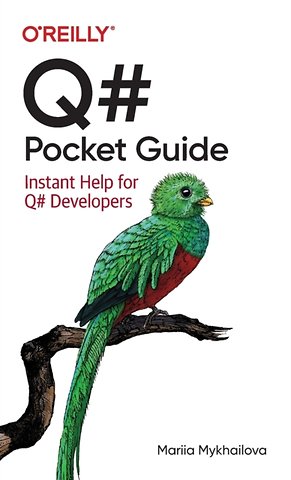Q# Pocket Guide
Instant Help for Q# Developers
Paperback Engels 2022 1e druk 9781098108861Samenvatting
Ready to build quantum computing applications using Q# and the Microsoft Quantum Development Kit? This is the book for you. Q# is a domain-specific language for expressing quantum algorithms that combines familiar "classical" language constructs with quantum-specific ones. Ideal for any developer familiar with (or willing to learn) the basics of quantum computing and looking to get started with quantum programming, this pocket guide quickly helps you find syntax and usage information for unfamiliar aspects of Q#.
You'll explore the quantum software development lifecycle from implementing the program to running it on quantum simulators to testing and debugging it. You'll learn to use the tools provided by Microsoft's Quantum Development Kit for each step of the process.
You'll explore:
- Q# language details, including data types, statements, and operators
- Guidelines for organizing Q# code and invoking it from different environments
- Information on simulators and tools in the Microsoft Quantum Development Kit
- Advice on testing and debugging tools and techniques for quantum programs
Specificaties
Lezersrecensies
Inhoudsopgave
Preface
Why I Wrote This Book
Who This Book Is For
Navigating This Book
Conventions Used in This Book
Using Code Examples
O’Reilly Online Learning
How to Contact Us
Acknowledgments
I. Q# Programming Language
1. Program Structure
Your First Q# Program
Namespaces
Operations and Functions
Type Declarations
Comments
Conclusion
2. Data Types
The Q# Type System
Primitive Classical Data Types
Qubits
Physics-Imposed Constraints
Abstracting Away Physical Implementation
The Qubit Data Type
Other Primitive Quantum Data Types
Measurement Results
Pauli Matrices
Data Structures
Arrays
Tuples
User-Defined Types
Operations and Functions
Conclusion
3. Expressions
Equality Operators
Comparison Operators
Logical Operators
Bitwise Operators
Arithmetic Operators
Conditional Expression
Range Operator
String Expressions
Array Expressions
User-Defined Type Expressions
Call Expressions
Lambda Expressions
Adjoint and Controlled Functors
Conclusion
4. Statements
Example: Calculate Euler’s Totient Function
Working with Variables
Variable Scope
Mutable and Immutable Variables
Declaring Immutable Variables: let Statements
Declaring Mutable Variables: mutable Statements
Reassigning Mutable Variables: set Statements
Assigning Tuples: Tuple Deconstruction
Conditional Execution: if Statements
Loops
Iterate Over a Sequence: for Loops
Classical Conditional Loop: while Loops
Call an Operation or a Function: Call Statements
Stop Execution: return and fail Statements
Finish Execution: return Statements
Throw an Exception: fail Statements
Example: Prepare a Quantum State
Allocate Qubits: use and borrow Statements
Quantum Conditional Loops: repeat-until Loops
Conjugation: within-apply Statements
Conclusion
5. Operations and Functions
Defining and Using Operations and Functions: The Basics
Signatures of Callables
Quantum Gates and Measurements
Defining and Using Adjoint and Controlled Specializations of Operations
Using Operation Specializations
Generating Operation Specializations Automatically
Defining Operation Specializations Manually
Functional Elements of Q#
Callable-Typed Variables
Using Callables as Arguments
Partial Application
Lambda Expressions
Defining and Using Type-Parameterized Callables
Conclusion
II. Using the Microsoft Quantum Development Kit
6. Running Q# Programs
Quantum Applications
Quantum Software Development
Quantum Simulators
Full State Simulator
Resources Estimator
Trace Simulator
Toffoli Simulator
Sparse Simulator
Noise Simulator
Running Q# Programs
Standalone Q#
Q# with a Classical Host
Q# with .NET Host
Q# with Python Host
Q# Jupyter Notebooks
Conclusion
7. Microsoft Quantum Development Kit Libraries
Getting and Using the Libraries
Standard Libraries
Microsoft.Quantum.Core: Built-In Functions and Attributes
Microsoft.Quantum.Convert: Data Type Conversions
Microsoft.Quantum.Logical: Logical and Comparison Functions
Microsoft.Quantum.Bitwise: Bitwise Functions
Microsoft.Quantum.Math: Classical Math and Arithmetic
Microsoft.Quantum.Random: Random Numbers and Probability Distributions
Microsoft.Quantum.Arrays: Generic Array Manipulation
Microsoft.Quantum.Intrinsic: Basic Quantum Gates and Measurements
Microsoft.Quantum.Diagnostics: Testing and Troubleshooting Quantum Programs
Microsoft.Quantum.Measurement: Additional Measurement Routines
Microsoft.Quantum.Preparation: Quantum State Preparation
Microsoft.Quantum.Arithmetic: Quantum Arithmetic
Microsoft.Quantum.Canon: Catchall
Advanced Libraries
Conclusion
8. Testing and Debugging
Inspecting Elements of Q# Programs
Classical Variables
Quantum States
Quantum Operations
Program Structure and Its Evolution
Testing Q# Programs
Two Ways to Write a Test
Standalone Q# Test Projects
Testing Classical Conditions
Testing Conditions on the Quantum State
Comparing the Unitaries Implemented by Operations
Conclusion
Index
About the Author
Anderen die dit boek kochten, kochten ook
Rubrieken
- advisering
- algemeen management
- coaching en trainen
- communicatie en media
- economie
- financieel management
- inkoop en logistiek
- internet en social media
- it-management / ict
- juridisch
- leiderschap
- marketing
- mens en maatschappij
- non-profit
- ondernemen
- organisatiekunde
- personal finance
- personeelsmanagement
- persoonlijke effectiviteit
- projectmanagement
- psychologie
- reclame en verkoop
- strategisch management
- verandermanagement
- werk en loopbaan






